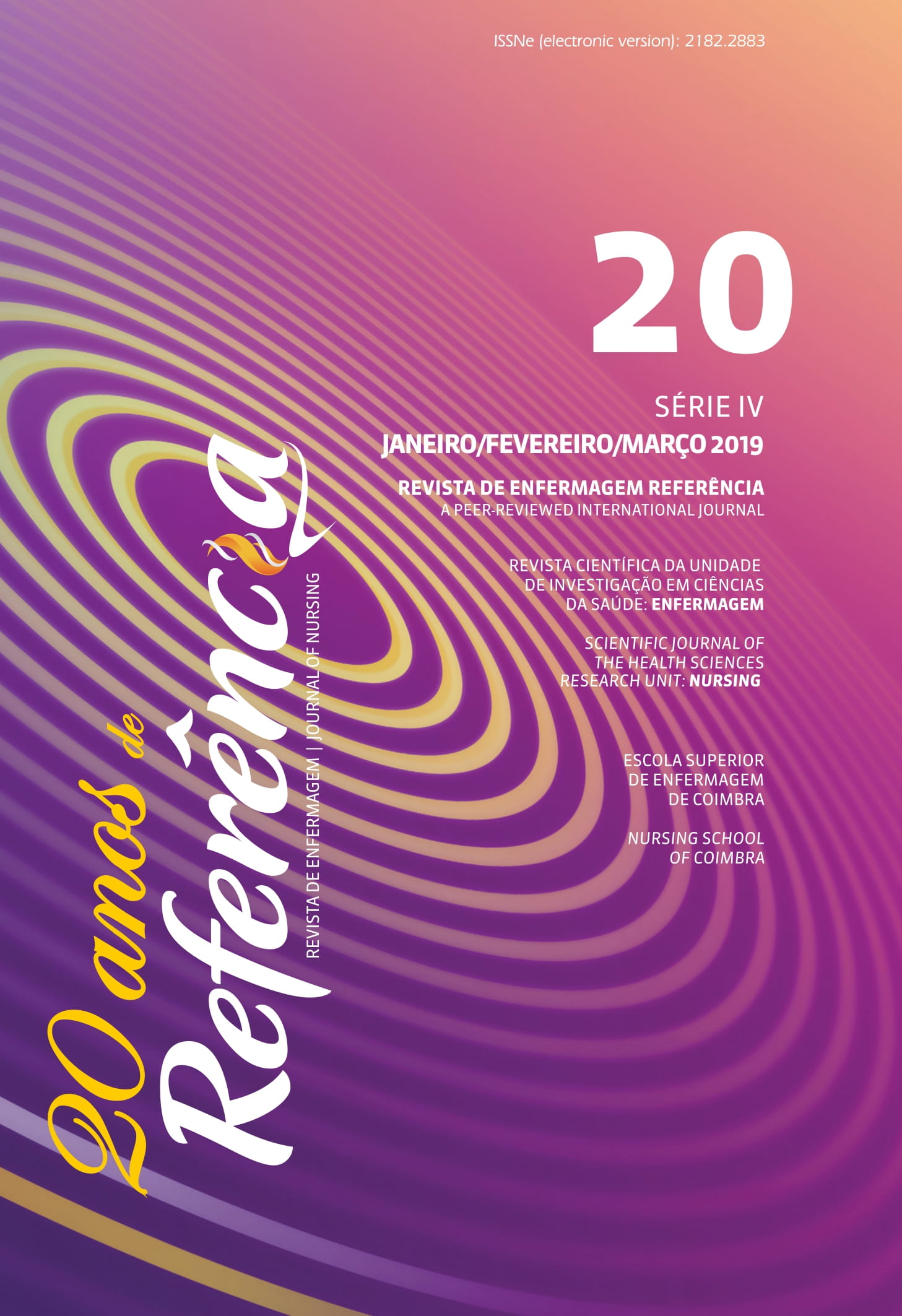Management of the pharmacological treatment in patients with chronic obstructive pulmonary disease
DOI:
https://doi.org/10.12707/RIV18068Keywords:
pulmonary disease, chronic obstructive, medication adherence, perceived competence, inhalersAbstract
Background: Chronic obstructive pulmonary disease (COPD) is a chronic and incapacitating disease, whose regimen includes inhalation medication. The evidence shows a low adherence, which may increase the aggravation of the disease.
Objectives: To study the adherence and the perceived competence of patients to comply with the treatment regimen of COPD and evaluate their knowledge on the use of inhalers.
Methodology: Quantitative and cross-sectional study, participants were 45 patients with COPD. We used the Medication Adherence Rating Scale (MARS), the Perceived Competence Scale (PCS), and a questionnaire on the use of inhalers.
Results: Participants reported good adherence to the medication regimen and reported a high degree of perceived competence to maintain the treatment regimen of COPD. However, they manifested little knowledge about the use of inhalers and the inhalation technique, which compromises the effectiveness of the established therapeutic plans and exacerbate the deterioration of the clinical condition.
Conclusion: This study suggests that nursing care should be developed with a focus on knowledge and training in the inhalation technique.
Downloads
References
Aguiar, R., Lopes, A., Ornelas, C., Ferreira, R., Caiado, J., Mendes, A., & Pereira-Barbosa, M. (2017). Terapêutica inalatória: Técnicas de inalação e dispositivos inalatórios. Revista Portuguesa de Imunoalergologia, 25(1), 9-26. Recuperado de https://www.spaic.pt/client_files/rpia_artigos/teraputica-inalatria-tcnicas--de-inalao-e-dispositivos-inalatrios.pdf
Almeida, M. C. (2013). Motivação e comportamento de saúde, relação com a qualidade de vida, em adultos da (Tese de doutoramento). Faculdade de Psicologia e de Ciências da Educação da Universidade do Porto, Portugal.
Azzi, E., Srour, P., Armour, C., Rand, C., & Bosnic-Anticevich, S. (2017). Practice makes perfect: Self-reported adherence a positive marker of inhaler technique maintenance. NPJ Primary Care Respiratory Medicine, 27(1), 29. doi:10.1038/s41533-017-0031-0
Bárbara, C., Rodrigues, F., Dias, H., Cardoso, J., Almeida, J., Matos, M. J., ... Burney, P. (2013). Chronic obstructive pulmonary disease prevalence in Lisbon, Portugal: The burden of obstructive lung disease study. Revista Portuguesa De Pneumologia, 19(3), 96-105. doi:10.1016/j.rppneu.2012.11.004
Blackstock, F. C., ZuWallack, R., Nici, L., & Lareau, S. C. (2016). Why don’t our patients with chronic obstructive pulmonary disease listen to us? The enigma of nonadherence. Annals Of The American Thoracic Society, 13(3), 317-323. doi:10.1513/AnnalsATS.201509-600PS
Bryant, L., Bang, C., Chew, C., Baik, S. H., & Wiseman, D. (2013). Adequacy of inhaler technique used by people with asthma or chronic obstructive pulmonary disease. Journal of Primary Health Care, 5(3), 191-198. doi:10.1071/HC13191
Gonçalves, P. R., Reveles, A., Martins, H. I., Rodrigues, I. L., & Rodrigues, S. M. (2016). Adherence to immunosuppressive therapy in kidney transplant recipients: Integrative literature review. Revista de Enfermagem Referência, 4(8), 121-130. doi:10.12707/RIV14063
Global Initiative for Chronic Obstructive Lung Disease. (2018). Global strategy for the diagnosis, management, and prevention of chronic obstructive pulmonary disease. Recuperado de https://goldcopd.org/wp-content/uploads/2017/11/GOLD-2018-v6.0-FINAL-revised-20-Nov_WMS.pdf
Hickey, S., Beeson, P., Furniss, S., Mulligan-Evans, F., Ryan, E., & Keech, J. (2017). The effect of structured education on inhaler technique. Practice Nursing, 28(5), 196-206. doi:10.12968/pnur.2017.28.5.196
Jácome, C., Marques, A., Gabriel, R., Cruz, J., & Figueiredo, D. (2015). Anxiety and depression in Portuguese patients with chronic obstructive pulmonary disease: A multicentre cross-sectional study. Revista Portuguesa de Medicina Geral e Familiar, 31(1), 24-32. Recuperado de http://www.scielo.mec.pt/pdf/rpmgf/v31n1/v31n1a04.pdf
Lorig, K. R., & Holman, H. R. (2003). Self-management education: History, definition, outcomes, and mechanisms. Annals Of Behavioral Medicine, 26(1), 1-7. doi:10.1207/S15324796ABM2601_01
Melani, A.S., & Paleari, D. (2016). Maintaining control of chronic obstructive airway disease: Adherence to inhaled therapy and risks and benefits of switching devices. Journal of Chronic Obstructive Pulmonary Disease, 13(2), 241-250. doi:10.3109/15412555.2015.1045972
Molimard, M., & Colthorpe, P. (2015). Inhaler devices for chronic obstructive pulmonary disease: Insights from patients and healthcare practitioners. Journal Of Aerosol Medicine And Pulmonary Drug Delivery, 28(3), 219-228. doi:10.1089/jamp.2014.1142
Pallant, J. (2010). SPSS survival manual: A step by step guide to data analysis using SPSS. Maidenhead, England: Open University Press/McGraw-Hill.
Pereira, M., & Silva, N. (1999). Escala de adesão aos medicamentos. Avaliação Psicológica: Formas e Contextos, 6, 347-351.
Pothirat, C., Chaiwong, W., Phetsuk, N., Pisalthanapuna, S., Chetsadaphan, N., & Choomuang, W. (2015). Evaluating inhaler use technique in COPD patients. International Journal Of Chronic Obstructive Pulmonary Disease, 10, 1291-1298. doi:10.2147/COPD.S85681
Price, D., Keininger, D. L., Viswanad, B., Gasser, M., Walda, S., & Gutzwiller, F. S. (2018). Factors associated with appropriate inhaler use in patients with COPD: Lessons from the REAL survey. International Journal Of Chronic Obstructive Pulmonary Disease, 13, 695-702. doi:10.2147/COPD.S149404
Riley, J., & Krüger, P. (2017). Optimising inhaler technique in chronic obstructive pulmonary disease: A complex issue. British Journal Of Nursing, 26(7), 391-397. doi:10.12968/bjon.2017.26.7.391
Rocha, V. (2017). A teoria da autodeterminação e a dependência tabágica em adultos após síndroma coronária aguda: Um estudo longitudinal (Tese de doutoramento). Faculdade de Psicologia e de Ciências da Educação da Universidade do Porto, Portugal.
Sriram, K. B., & Percival, M. (2016). Suboptimal inhaler medication adherence and incorrect technique are common among chronic obstructive pulmonary disease patients. Chronic Respiratory Disease, 13(1), 13-22. doi:10.1177/1479972315606313






















